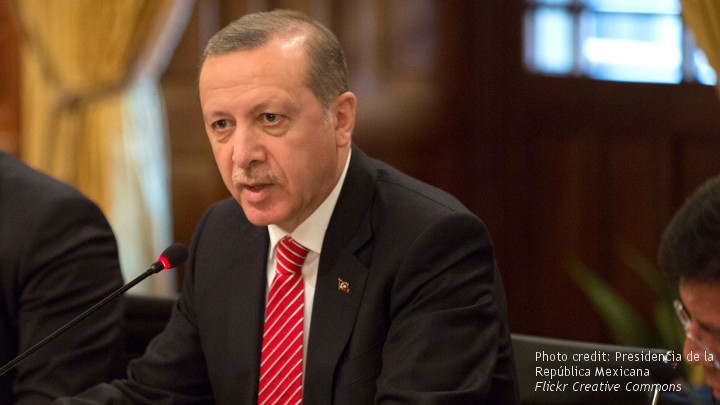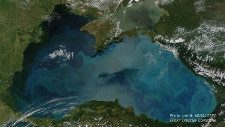Turkey’s Proposed Constitutional Changes and Erdoğan’s Forever War

Gareth H. Jenkins
The package of proposed amendments to the Turkish constitution that were announced on December 10 foresee the gradual concentration of even more power in the hands of President Recep Tayyip Erdoğan, leading to the introduction of a full presidential system in November 2019. Yet recent events have shown that the more power Erdoğan exercises, the worse the situation in Turkey becomes.
BACKGROUND: On December 10 the ruling Justice and Development Party (AKP) and the opposition Nationalist Action Party (MHP) announced details of a package of 21 proposed changes to the Turkish Constitution. The announcement followed two months of secret negotiations between the leaderships of the two parties and Erdoğan’s advisers. When Prime Minister Binali Yıldırım and MHP Chair Devlet Bahçeli held a joint press conference on December 1 to reveal that they had reached an agreement, Yıldırım twice stated that the most important change would be the removal of the current ban on the president being a member of a political party – and declined to provide any further details. However, when the details were made public, it became clear that Yıldırım had been disingenuous. Far from merely allowing the president to be a member of a political party, the proposed changes foresee the replacement of Turkey’s parliamentary system with one in which all power is officially concentrated in Erdoğan’s hands – although the transition to what would effectively be a de jure autocracy would not occur until November 2019, when the package envisages simultaneous presidential and parliamentary elections, after which Erdoğan could rule for two successive five-year terms.
The proposed changes include the abolition of the post of prime minister and the naming of the president as the official head of the executive. The president will choose the ministers in the Cabinet and also be able to name one or more vice presidents. Both the ministers and the vice presidents can be chosen from either inside or outside parliament. If they are chosen from parliament, they will be required to vacate their seats. These vacant seats will then be filled by members of the same party who were included on the list of candidates for the same electoral district but who failed to be elected. As a result, the package also states that, in general elections, political parties will be required to name more candidates – in order of preference – than the number of available seats in the electoral district concerned. The highest placed unsuccessful candidates on a party’s list will then serve as “substitute deputies”, ready to replace deputies from their own parties who are appointed ministers or vice presidents.
In addition, the package proposes an increase in the number of members of parliament from 550 at present to 600 – and the lowering of the age at which candidates can be parliamentary deputies from 25 to 18.
Parliament will still be regarded as the legislature. Deputies will continue to draft, discuss and vote on new laws, which will then be forwarded to the president for final approval. However, if s/he sees fit, the president will be able to bypass parliament completely and introduce legislation by issuing decrees with the force of law – which is how Erdoğan has been governing the country since the declaration of a State of Emergency on July 21, 2016.
In addition, the constitutional amendments will give the president complete control over security policy and decisions related to the deployment of military force, although the right to declare war will remain with parliament. The president will also be responsible for drawing up the annual state budget and submitting it to parliament for approval.
Other proposed changes include the abolition of the system of military courts for all but disciplinary offences, a reduction in the members of the Constitutional Court from 17 to 15, and a restructuring of the Supreme Board of Judges and Prosecutors (HSYK), which oversees all appointments and promotions in the judicial system. The restructured HSYK will have 12 members, down from 22 at present. Half of the members will be chosen by the president and the other half by parliament. The president will be personally responsible for choosing and dismissing the holders of all other high level positions in the state apparatus. Unlike the transfer of executive power, these reforms to the judicial system will become effective as soon as the constitutional amendments are approved.
The package includes provisions for the impeachment of the president through a laborious, three-stage process which would ultimately require the support of 400 of the 600 members of the expanded parliament in order for him/her to be removed from office.
The parliamentary constitutional committee is expected to begin debating the constitutional amendments later this month, a process which would normally take around two weeks. However, there is speculation that the government may attempt to delay the presentation of the package to the full assembly of parliament until after the end of the State of Emergency, which is currently due to expire on January 19, 2017 – on the grounds that proposing regime change at a time when there are official constraints on rights and freedoms would damage its democratic credentials. On December 1, Yıldırım publicly assured business leaders that the State of Emergency would not be extended. However, Yıldırım’s statement on the same day about the content of the constitutional package has raised questions about his reliability. Nor is it clear whether Erdoğan will be prepared to relinquish the draconian powers afforded him by the State of Emergency.
Under Turkish law, the support of 367 of the 550 members of parliament is required for constitutional changes to be enacted automatically. If 330 or more vote in favor, then the president can decide to put the constitutional changes to a referendum 60 days later, which – in this case – would probably be in March or April 2017.
IMPLICATIONS: The AKP currently has 316 voting members of parliament. The MHP has 39. The package is expected to split the MHP, with at least 15 members voting against it. Several AKP deputies are known to be privately opposed to a presidential system. But whether or not they vote against the package may depend on whether the vote is by secret ballot. Although the general expectation is that Erdoğan will receive the 330 votes he needs, the result could still be close.
Opinion polls suggest that, although support has risen since the failed July 15 putsch, the public is currently almost evenly divided on a presidential system. If the package goes to a referendum, Erdoğan cannot afford to lose. Consequently, he can be expected to utilize all of the powers at his disposal – including his control over the Turkish media – both to push for regime change and to impose constraints on campaigns by its opponents. There are also concerns about the possibility of electoral fraud during the counting of the votes, similar to what appears to have happened in some districts in the March 30, 2014 local elections.
Proponents of the package argue that its proposed presidential system is no less democratic than those already in place in countries such as the U.S. and France. This is not true. Apart from the theoretical possibility of impeachment, the package includes no system of checks or balances. Even though it is difficult to argue that either have ever been complete in Turkey, in recent months any last vestiges of judicial independence and freedom of expression have been erased. Turkish critics of Erdoğan who have not already been jailed face the ever-present risk of imprisonment; for foreigners it is the prospect of expulsion from the country. Censorship and self-censorship mean that Erdoğan and the AKP now have almost total control over the flow of information to the general public – and it is this information on which voters based their decisions in elections and referenda. In such a context, issues such as whether a president or a prime minister heads the executive are irrelevant to whether or not Turkey can be considered a functioning democracy.
In addition, there are questions about whether the proposed new regime would be able to deliver. One consideration is continuity. Extraordinarily, although they repeatedly extol his uniqueness, Erdoğan’s supporters have failed to explain what will happen to a system that has been handcrafted for him personally. His continued health is far from assured and there is no viable successor. Although both Erdoğan’s favorite son Bilal and his son-in-law Berat Albayrak have been touted as possible heirs, neither possesses the qualities required – not least, despite all of his other shortcomings, Erdoğan’s unprecedented ability to connect with the Turkish masses.
There are also questions about whether Erdoğan can deliver, either under the current system – which, though parliamentary in theory, is now presidential in practice – or if a presidential system is formally introduced from November 2019. One concern is competence. In recent years, Turkish policies have become increasingly shaped by Erdoğan’s personal whims and whimsies. Particularly since Turkey was swept by what have become known as the Gezi Park Protests in summer 2013, these have included a tendency for Erdoğan to ascribe all setbacks, failures and miscalculations to Western conspiracies to prevent Turkey’s otherwise inexorable rise to regional and global pre-eminence under his rule – and to claim that the world’s Muslims, particularly in the Middle East, look to Turkey for leadership. None of this is true. But this has not stopped Erdoğan from believing it. In fact, the more evidence that emerges to demonstrate that he is wrong, the more he appears convinced that he is right. Moreover, the longer Erdoğan has remained in power, the greater has been his tendency to prioritize personal loyalty over ability, with the result that – rather than contributing expertise or a nuanced understanding of the world – his inner circle has become little more than an echo chamber. There currently appears no reason to hope this will change if Turkey moves to a presidential system in 2019. If anything, it is likely to become worse.
CONCLUSIONS: When the Gezi Park Protests broke in 2013, there was a sense that Turkey had entered the final stage of the Erdoğan era – and that it would be a prolonged and highly turbulent period. Neither recent events nor the announcement of the proposed constitutional changes have done anything to change that view. The more power has been concentrated in Erdoğan’s hands, the more the situation in the country has deteriorated – socially, politically, economically and in terms of security. Most dangerously, Erdoğan’s conspiracy theories increasingly portray his domestic opponents and critics as serving foreign powers who are desperately plotting to undermine him. The conspiracy theories serve a purpose, in as much as they distract Erdoğan’s supporters from the real reasons for the mounting problems in the country – but they are tearing Turkish society apart. Yet it is difficult to envisage Erdoğan relinquishing them. In fact, he has arguably made his political survival dependent on sustained tension and the inoculation of a siege mentality amongst his supporters. The fear is that the cost – socially, politically, economically and in bloodshed – is only going to rise over the months and years ahead. In this context, a more urgent question than whether Turkey will undergo regime change in 2019 is what is likely to happen in the country before then.
Related Publications
-
ISDP Annual Report 2023
ISDP’s Annual Report for the year 2023. We look back on 2023, a year in which tensions and conflicts captured the strategic space in ISDP’s focus areas, making headlines around […]
-
A New Spring for Caspian Transit and Trade
Major recent shifts, starting with the Taliban victory in Afghanistan and Russia’s war in Ukraine have led to a resurgence of the Trans-Caspian transportation corridor. This corridor, envisioned in the […]
-
Turkey’s Opposition Can’t Win Without the Working Class
Kemal Kilicdaroglu, the leader of Turkey’s main opposition Republican People’s Party (CHP), has a realistic chance of defeating President Recep Tayyip Erdogan in the upcoming presidential election on May 14. […]
-
Promise And Peril In The Caucasus
America’s national security bureaucracy separates the Caucasus and the Middle East into different bureaus, with Central Asia in yet another office. This is part of the reason the U.S. has […]



